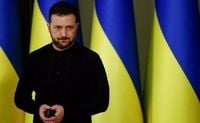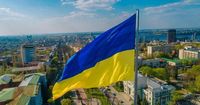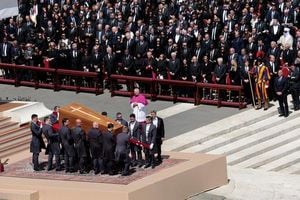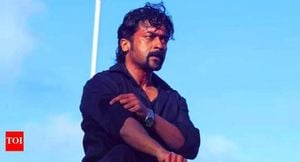In a revealing statement, President of Ukraine Volodymyr Zelenskyy and his chief of staff, Andriy Yermak, have acknowledged that the hopes for Ukraine's accession to NATO may not come to fruition. This acknowledgment comes from a comment by US Special Envoy Steven Whitkoff, released in an interview with American journalist Tucker Carlson on March 21, 2025.
In the conversation, Whitkoff mentioned, "As for NATO, I think Zelenskyy and his right-hand, Yermak, acknowledged that they [Ukraine] will not become a NATO member.” This statement reflects a pivotal moment in Ukraine's ongoing quest for NATO membership, which has been a topic of significant international dialogue, especially amid ongoing tensions in the region.
The admission from the Ukrainian leadership raises questions about the future of NATO's eastern expansion and the strategic alliances in the wake of Ukraine's struggles. Historically, Ukraine sought NATO membership as a way to bolster its security in the face of aggression from surrounding nations, particularly Russia. However, the latest statements appear to indicate a shift in that narrative.
In the same interview, Whitkoff highlighted another critical aspect of Ukraine's governance. He remarked, "Yes, the elections will take place. The Ukrainian leadership has already agreed to it. Presidential elections in Ukraine will happen.” This affirmation supports the sense of optimism regarding democratic processes in the country, following ongoing turbulence.
The context of this admission stems from both internal challenges faced by Ukraine and geopolitical realities that have shaped the narrative of its relationship with NATO. While the membership has long been a goal for Ukrainian authorities, the alignment with Western powers in the face of Russian threats is seen as a complex, nuanced issue.
Whitkoff's reflections underscore not only the practicality of Ukraine's tactical decisions but also highlight the immense pressure the country faces from global powers and its obligations to its populace. The decision to hold elections signals a commitment to democratic values, even amidst challenging circumstances.
As the international community looks on, Ukraine's navigation through this new strategic landscape will likely affect not only its internal policy but also broader international relations, especially with NATO member nations. Zelenskyy's admissions could lead to a reevaluation of security protocols and partnerships regarding Eastern European integrity.
This unfolding chapter in Ukraine's history emphasizes how critical it is for the country to balance its national interests with the expectations placed upon it by the international community. Analysts suggest that the acknowledgment of NATO membership challenges indicates a realistic assessment of Ukraine's geopolitical standing amid ongoing regional conflicts.
In summary, recent comments made by Ukrainian leadership have opened a discourse about the viability of NATO membership, while also shining a light on the importance of elections. Whitkoff’s declarations highlight significant aspects of Ukraine's present and future trajectory within the international political arena.
As events unfold, observers will be keen to see how these dynamics play out and whether Ukraine manages to find a sustainable path forward amidst the complexities of both internal and external political pressures.





